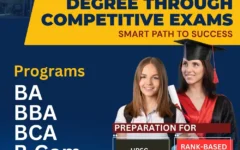M.A. in Gurmat Sangeet at Desh Bhagat University
November 24, 2025 2025-11-26 7:10M.A. in Gurmat Sangeet at Desh Bhagat University

M.A. in Gurmat Sangeet at Desh Bhagat University
At Desh Bhagat University (DBU), we are proud to offer a special postgraduate programme in M.A. in Gurmat Sangeet. This course is perfect for those who are passionate about devotional Sikh music and want to explore its theory, practice, and cultural importance. In this article, we will explain what Gurmat Sangeet is, what the M.A. in Gurmat Sangeet programme includes, why you should choose DBU for this course, what you will learn, the eligibility criteria and admission process, and the career opportunities after you complete the programme. We will keep the language simple and easy to understand, so you can see how DBU can guide you on this exciting academic and musical journey.
What is Gurmat Sangeet?
The term Gurmat Sangeet refers to the devotional music tradition of the Sikh faith, centered around singing and understanding the sacred hymns (Shabads) from the Sikh scriptures. This music is often performed using specific ragas (melodic modes) and traditional instruments. At Desh Bhagat University (DBU), we view Gurmat Sangeet not only as an art form but as a living tradition that is deeply connected to spirituality, culture, and musical heritage. It is where music intersects with devotion, theology, and cultural preservation.
In our M.A. in Gurmat Sangeet programme, you will explore the theory of Sikh ragas, practice vocal and instrumental performance, study sacred scriptures, and help preserve and expand this beautiful tradition.
Choosing the M.A. in Gurmat Sangeet at DBU means embracing a rich musical heritage and gaining skills that blend scholarly knowledge with artistic performance. This programme helps you grow as both a musician and a cultural ambassador of Gurmat Sangeet.
Why choose the M.A. in Gurmat Sangeet at Desh Bhagat University?
There are several reasons why our university is well‑suited for offering this course:
- Specialised Department: The Faculty of Social Sciences and Languages at DBU includes a Department of Gurmat Sangeet. This means the focus of the programme is built into the institution’s structure.
- Clear Programme Listing: Our University lists M.A. programmes in Music, Music Vocal, and Gurmat Sangeet among its offerings. That shows we recognise Gurmat Sangeet as a valid academic track.
- Modern Infrastructure & Tradition: At DBU, we combine modern teaching‑learning facilities (music labs, practice rooms, performance halls) with deep respect for musical traditions. As our website says, we are one of the top music colleges in Punjab, providing advanced facilities and experienced faculty.
- Cultural Commitment: We are committed to preserving cultural traditions and promoting Punjabi language, folklore, and music. Our prospectus emphasises this ethos within our Faculty of Social Sciences and Languages.
- Clear Eligibility and Duration: The programmes are clearly defined with a duration of two years and eligibility criteria lying within recognisable university norms.
These factors make the M.A. in Gurmat Sangeet at DBU a great choice for students seeking to combine academic depth with musical artistry in a supportive environment.
Structure and Course Content of the M.A. in Gurmat Sangeet
The M.A. in Gurmat Sangeet at DBU is designed as a two‑year postgraduate programme (i.e., four semesters), aligning with our standard for M.A. level courses. Below, I outline how the programme works and what you are likely to study.
Duration and Format
- Duration: 2 years, divided into four semesters.
- Format: Each semester has a mix of theory lectures, practical sessions, performance/practice labs, research components, workshops, and a final semester project or thesis.
What You Will Study
Since the programme focuses on Gurmat Sangeet, you will cover these broad areas:
- Musical Theory & History: You will study the historical development of Sikh devotional music, ragas, tala (rhythms), traditional instruments, and the way Gurmat Sangeet evolved.
- Practice (Vocal & Instrumental): You will learn vocal techniques specific to Gurbani singing, traditional instruments (such as harmonium, tabla, possibly rabab, etc), and ensemble/solo performance.
- Scriptural Context: Study the role of Gurmat Sangeet in Sikh scripture, how Shabads are set to ragas, the theological meaning of the hymns, and the cultural significance of music in Sikh tradition.
- Research Methodology: Since this is an M.A., you will learn research methods in musicology and culture, and prepare a thesis or project work around topics such as traditional instruments, musical forms in Sikh music, or modern interpretations.
- Modern Media & Music Production: Given the music landscape is changing, you will also get exposure to recording techniques, digital music production, archiving musical heritage, and perhaps fusion forms – always keeping the roots of Gurmat Sangeet alive.
- Performance & Recital: Practical performance is important. You will take part in recitals (solo or group), workshops, and possibly seminars or conferences focusing on Gurmat Sangeet (for instance, DBU hosts an international seminar on Gurmat Sangeet)
Skills You Will Gain
On completing the programme, you will be able to:
- Sing and perform devotional Sikh music with technical proficiency and cultural sensitivity.
- Play or accompany traditional instruments used in Gurmat Sangeet, understand their roles and contexts.
- Conduct scholarly research into the musical traditions of Sikhism, including ragas, instruments, historical changes, and modern adaptations.
- Produce recordings, archive musical work, and use digital tools to preserve musical heritage.
- Develop a strong cultural and musical identity so you can appear in performance, teaching, research, or heritage preservation roles.
- Communicate effectively about music—its theory, practice, and cultural meaning—to diverse audiences including students, scholars, and lay listeners.
Eligibility for the M.A. in Gurmat Sangeet
If you wish to join our M.A. in Gurmat Sangeet programme, here are the eligibility norms at DBU:
- You must have completed a Bachelor’s degree (in any discipline) from a recognised university/institution.
- Minimum marks required: For general category students, at least 45% aggregate marks in bachelor’s (or specified subject) from a recognised university. For SC/ST/OBC categories, some relaxation may apply.
- The candidate should have sufficient interest in music or related fields, ideally with some background or commitment to devotional/traditional music, although the formal requirement is an undergraduate degree.
- Admission process: You will apply via DBU’s admissions portal, submit your bachelor’s degree certificate, mark sheet, identity proof, and possibly attend an interview or audition (depending on the music faculty’s norm).
By ensuring you meet these eligibility criteria, you place yourself in a good position for admission. Early preparation of documents and interest in Gurmat Sangeet will help you stand out.
Career Opportunities after M.A. in Gurmat Sangeet
Completing the M.A. in Gurmat Sangeet at DBU opens multiple career paths. Because this programme combines devotional music tradition with scholarly and performance skills, you will be ready for roles such as:
- Professional Performer / Ragi: You can sing Gurbani kirtan in gurdwaras, perform traditional and devotional music concerts, or work as a devotional‑music artist.
- Music Teacher / Lecturer: You can teach Gurmat Sangeet, music theory, Sikh music traditions at colleges, music schools, or within community institutions.
- Researcher / Musicologist: With your research training, you can work on projects documenting, preserving, and analysing Gurmat Sangeet traditions, instruments, ragas, and musical heritage.
- Music Producer / Archivist: You can produce recordings of devotional music, work on digital archiving of heritage music, or work in media/recording studios focusing on Sikh and devotional music.
- Cultural Preservation Specialist: With expertise in Gurmat Sangeet, you can contribute to cultural institutions, museums, or heritage organisations that preserve Sikh music traditions.
- Composer / Arranger: You may compose new musical works or arrangements rooted in the Gurmat tradition, for devotional, educational, or media use.
- Community Music Facilitator: You can lead community music programmes, workshops in places of worship, youth programmes in Sikh music, etc.
By studying at DBU, you not only gain academic credentials but also performance‑based skills that make you employable in both traditional and contemporary music fields.
How to Apply & What to Expect at DBU
When you decide to join the M.A. in Gurmat Sangeet programme at DBU, here is how we guide you:
- Check the Admissions Portal: Visit the admission page and look for admissions for Post‑Graduate programmes, and find the listing for M.A. in Gurmat Sangeet (or M.A. Music with the Gurmat Sangeet specialisation).
- Fill the Application Form: Complete the online application form or physical form as per the instructions. Upload required documents (degree certificate, mark‑sheet, ID proof, photograph).
- Document Verification and Eligibility Check: Our admissions team will verify your bachelor’s degree and aggregate marks to ensure you meet the minimum eligibility.
- Audition/Interview (if applicable): Because this is a music‑centric programme, there may be an audition or practical test of your interest or ability in music, along with a personal interview.
- Seat Confirmation & Fee Payment: Upon selection, you will get an offer letter. You confirm your seat by paying the required fee by the deadline. (For fee details, refer to the DBU fee schedule.)
- Commencement of Classes: Once you are enrolled, you start classes as per the academic calendar. Expect orientation, introduction to music labs, practical sessions, and coursework from day one.
At DBU, you will find a supportive faculty, music labs, practice rooms, performance opportunities, and a lively campus culture that values both tradition and modernity.

What Makes Our Programme Unique?
Here are some features that make our M.A. in Gurmat Sangeet special:
- We focus on Gurmat Sangeet as a dedicated stream — not just general music, but one rooted in Sikh devotional tradition and scholarship.
- We combine performance, theory, and research in one programme, preparing you to sing, to analyse music, and to preserve it.
- Our campus environment encourages you to engage with culture, music, language, and community. We hold seminars, workshops, and musical events (for example, an international seminar on Gurmat Sangeet) to deepen your exposure.
- We provide modern facilities — practice rooms, music labs, performance halls — alongside traditional training, ensuring you can hone your craft practically and academically.
- Our teaching focuses on cultural values, ethics, and community service, along with musical excellence. This matches the spirit of Gurmat Sangeet.
- We recognise that graduates will carry forward this musical tradition into modern contexts — whether teaching, performing, researching, or producing music.
Summary
If you are passionate about Sikh devotional music, its rich traditions, its musical depth, and its cultural significance, then the M.A. in Gurmat Sangeet at Desh Bhagat University offers you a well‑structured, successful, and professionally relevant pathway. Over two years, you will study theory and history, perform serious, in-depth research, and build a career that honours this unique musical heritage.
By the time you complete the programme, you will be ready to perform, teach, research, preserve, and innovate in the field of Gurmat Sangeet. At DBU, we commit to guiding you, equipping you, and helping you shine — both as a musician and as a scholar.
If you are ready to start this successful journey, we invite you to apply, prepare your documents, and enter a world where music connects with devotion, tradition blends with modernity, and your talent shines in the sacred art of Gurmat Sangeet. We look forward to welcoming you to the DBU family and supporting your success in this noble and beautiful field.
FAQs
1. What is Gurmat Sangeet?
Answer: Gurmat Sangeet refers to the devotional music of the Sikh faith. It is based on hymns (Shabads) found in the Guru Granth Sahib, which are sung in specific ragas (musical modes). This music is deeply connected to spirituality, and its purpose is to convey the teachings of Sikhism through song and melody.
2. What will I learn in the M.A. in Gurmat Sangeet programme at DBU?
Answer: In the M.A. in Gurmat Sangeet programme at Desh Bhagat University, you will study the theory and history of Gurmat Sangeet, learn vocal techniques, practice traditional instruments, and explore the role of music in Sikh spiritual practices. You will also gain research skills and have opportunities for practical performance.
3. What are the eligibility requirements for the M.A. in Gurmat Sangeet at DBU?
Answer: To apply for the M.A. in Gurmat Sangeet, you must have a Bachelor’s degree from a recognised university. While a background in music is helpful, it is not mandatory. You should have an interest in devotional music and be ready to engage with the sacred hymns and practices of Sikhism.
4. How long does the M.A. in Gurmat Sangeet course last?
Answer: The M.A. in Gurmat Sangeet at Desh Bhagat University is a two-year postgraduate programme, divided into four semesters. In these two years, students will study both theoretical aspects and practical applications of Gurmat Sangeet, including vocal and instrumental performance, music history, and research.
5. What is the structure of the M.A. in Gurmat Sangeet course?
Answer: The M.A. in Gurmat Sangeet programme at DBU includes a combination of theoretical lectures, practical sessions, and research. Students will study music theory, the history of Gurmat Sangeet, the study of ragas, and Sikh scriptures. They will also engage in vocal and instrumental practice and complete a dissertation or recital in the final semester.
6. Are there any entrance exams for the M.A. in Gurmat Sangeet at DBU?
Answer: There may be an entrance test or interview as part of the admission process for the M.A. in Gurmat Sangeet at DBU. This is typically used to assess your basic musical knowledge or interest in Gurmat Sangeet. It is important to check the specific admission guidelines for the year you plan to apply.
7. What are the career opportunities after completing the M.A. in Gurmat Sangeet?
Answer: Graduates of the M.A. in Gurmat Sangeet can become performers (Ragis), music teachers, researchers, composers, producers, or cultural preservationists. Many work in gurudwaras, music schools, cultural institutions, and recording studios, promoting Sikh music and culture.
8. Can I apply for the M.A. in Gurmat Sangeet if I don’t have a music background?
Answer: Yes, you can apply for the M.A. in Gurmat Sangeet at Desh Bhagat University even if you do not have a formal music background. However, having an interest in music, especially Sikh devotional music, will help you succeed in the programme. The course aims to equip students with the necessary skills, whether they are beginners or have prior knowledge
9. What makes the M.A. in Gurmat Sangeet at DBU unique?
Answer: The M.A. in Gurmat Sangeet at DBU is unique, combining traditional Sikh devotional music, practical performance, and modern research. DBU offers expert faculty, top-notch music facilities, and cultural engagement opportunities, making it ideal for students passionate about preserving and promoting Gurmat Sangeet.
10. How do I apply for the M.A. in Gurmat Sangeet at DBU?
Answer: To apply for the M.A. in Gurmat Sangeet at Desh Bhagat University, visit the admission page and fill out the online application form. You will need to submit your academic records, identity proof, and other required documents. After applying, there may be an entrance test or interview to assess your suitability for the programme.






